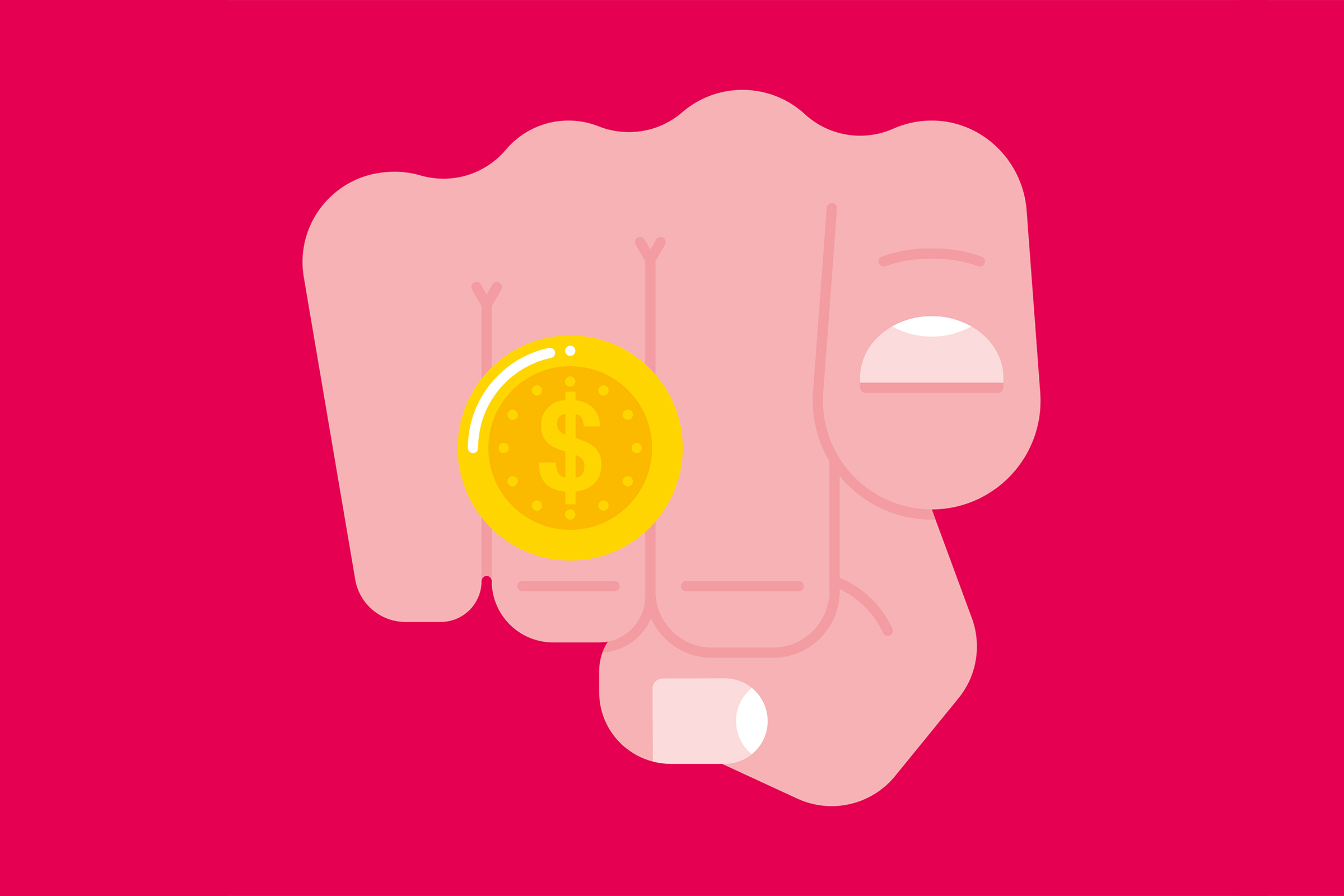I'm generally not ashamed to talk about personal matters. In fact, I'm known for oversharing. At parties, I'm always good for a few cringey anecdotes plucked from my lackluster dating life. As a writer, I’ve never shied away from sharing the vulnerable, sometimes ugly, side of my evolving relationship with self-worth. Even my earliest report cards mention my garrulous nature: "Jamie Feldman: Talks too much."
But there's one topic that I've kept quiet for as long as I could remember: money—or in recent years, the lack of it.
I’ve maintained a fluctuating level of credit card debt for over a decade. At its highest, it hovered around $18,000. From that first moment in my hopeful early 20s when I felt the shiny piece of plastic in my hands, I was hooked. Now this, I thought, was freedom. I recklessly opened card after card, blatantly ignoring interest rates, skating by on minimum payments, and maintaining a hefty balance at all times.
Growing up, there wasn’t a whole lot of talk about money in my house. There was just a general sense there was never really enough of it. As a result, I have, for the majority of my adult life, maintained a pretty precarious balancing act of both living in a scarcity mindset and way beyond my means. I’ve gone through periods of unflinchingly forking my credit card over at a $100-per-person group dinner, then spent the following weeks living off of ramen and tinned fish. I’ve thrown caution to the wind and booked trips because “I deserve it!” then spent hours spiraling at the sight of my bank account, if I wasn’t too afraid to even check my bank account, that is. Add to that a pretty deep seated propensity to people please and an inability to say no, and you have a person who is pretty much guaranteed to spend money they don’t have.
I never revealed the extent of my troubling money habits to anyone, and frankly, I didn’t actively fret over them. The consequences of my behavior felt so removed from my day-to-day life that I treated them as if they weren't there. I didn’t have judgments about other people’s debt, either—because I naively assumed I was the only one with this kind of debt. But considering the fact that American household debt hit a record $16.9 trillion in 2022, the only explanation I can fathom for this mindset was deep, internalized shame.
The facade started to show its cracks in 2021, when smack in the middle of the pandemic, I lost my job—a job that I had held for over seven years and was the only thing keeping me afloat in the sea of my spending habits. Suddenly, the debt wasn’t something I’d get around to paying off eventually. It was something I needed to face. Now.
Read More: Overwhelmed By Debt? Here’s Where to Start
First, I confided in a close friend, which admittedly was terrifying. I was convinced that she’d see me differently, or feel as though I’d tricked her into thinking I was a good person all of these years when, actually, I had this deep, dark secret the whole time.
What actually happened was this: She simply said, “OK,” marched me straight into her office, pulled up a chair and her favorite budgeting software, Tiller, and sat there with me at her desk for hours, teaching me how to use it and exactly how to make a budget. Most importantly, she taught me how to stop avoiding the problem. She showed me that my trouble with finances was not—and is not—indicative of who I am as a person. It was invaluable.
Once I opened that door to the secret, I realized it was up to me to make sure it stayed open. Telling one person provided me with a huge sense of relief. I wasn’t alone. But then came the hard part: holding myself accountable. I needed to do something so brash, loud, and dramatic that nothing would remain in the shadows of my denial. I needed to conjure the Jamie Feldman that "talks too much.”
Telling the entire internet might sound extreme, but I knew I’d be less inclined to give up if there were some stakes involved.” So I opened a TikTok account and started talking. In one breathless post, I shared the full story of my debt. As a 30-something millennial with only a vague understanding of how TikTok worked at the time, the “entire internet” felt more like screaming into the void. I didn’t know anyone using it, so there was a sense of anonymity that gave me confidence that this was just a mental exercise.
Of course, as I’d soon realize, it was not anonymous at all. Suddenly people started liking my videos. I went from a couple hundred followers to 20 thousand followers within a few weeks. I realized I hadn't really thought this out. What would all these people think of me?
But what came next was far scarier. Friends, acquaintances and family members started to follow me. What was I thinking? Not only was I worried about embarrassing myself, I was worrying about embarrassing them. What would my mom think? My aunt, my nana, what would all our family friends think? What would my mom's ex-coworker who I met exactly one time think? I braced for judgment.
Turns out, I was bracing for nothing. Not only did the thousands of strangers reach out with kind words, so did my friends and family. My mom sent supportive, emoji-filled cheers. My friends encouraged me to keep going, invited me over for dinner, and indulged my new budget-friendly suggestions when we made plans. But what was perhaps more surprising was that everyone had their own money story to share. People wanted me to know that they had debt and how they got out of it. These were stories I’d never heard, from some of the people in my life that I am closest to.
The first time one of my videos hit 1 million views, I realized this was much bigger than me. My story is not unique. It’s just that most of us are suffering in silence. My DMs were flooded with people telling me their debt stories and my comments were full of cheers of recognition and solidarity. In some cases, I was the first person they’d ever spoken to about it. Most people said they'd never told anyone about their credit card debt. Breaking my silence helped them break theirs, and together we realized that talking about it was the only way to escape the deep shame that underlies that silence—and the only way to pave a different path forward.
I’m not a personal finance expert, and I don’t pretend to be. In fact, I find most experts get it wrong. Most of them tell you to change your behavior but don't acknowledge the deep seated reasons why that behavior started in the first place. Popular methods for personal finance also rely on their own shame tactics to change your behavior: you don’t work hard enough; you’re stupid for getting yourself into this situation in the first place; you should feel like you’re suffering while you pay debt down so you don’t get yourself into it again. This is only doubling down on the root cause. Instead, my goal is this: to continue telling my story, and to help people get comfortable with the fact that getting out of debt is a group sport, not a solo mission.
We cannot feel empowered to shift our situation—financial or otherwise—if we don’t feel empowered to share our truths first. I was never going to squeeze myself out of debt without pushing through the shame first and talking about it honestly.
My life looks a lot different now than it did three years ago. My social calendar and circles are smaller. I move slowly and with intention. I track my spending and, for the first time in my life, I have a budget. And I have a community of people to share that with, who see me, debt and all, and refuse to believe my financial issues have anything to do with my goodness or humanity.
I have rejected all of my prior judgments of being in debt—both toward myself and others. Shame is not an effective tool for creating change, but connection certainly is.
More Must-Reads from TIME
- Why Trump’s Message Worked on Latino Men
- What Trump’s Win Could Mean for Housing
- The 100 Must-Read Books of 2024
- Sleep Doctors Share the 1 Tip That’s Changed Their Lives
- Column: Let’s Bring Back Romance
- What It’s Like to Have Long COVID As a Kid
- FX’s Say Nothing Is the Must-Watch Political Thriller of 2024
- Merle Bombardieri Is Helping People Make the Baby Decision
Contact us at letters@time.com

